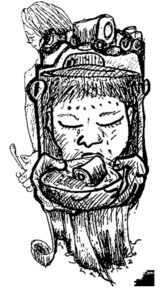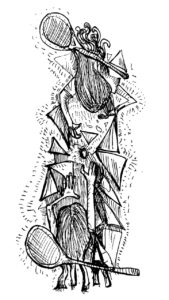Sinigang [Nonfiction]

The tangy, sour smell of tamarind soup filled the air as I stepped into the kitchen.
My mouth watered automatically, memories of my mother’s cooking flooding my senses. She was always so good at making Sinigang, the sourness perfectly balanced by the sweetness of the meat and vegetables. It was one of my favorite dishes, and she always seemed to know just how much sourness to add to make it perfect. As I waited for the soup to simmer, I remembered how she used to take me to school every morning. She would wake up early, even earlier than me, so she could fix breakfast and get me ready for the day. She would brush my hair, tie my shoes, and even help me with my homework sometimes.
It was the simple things like that which made me realize how much she truly loved me.
I also recalled the times when we would sit together on the porch, watching the sunset, and she would tell me stories about her childhood in their province. She would talk about the food they used to eat, like Sinigang for example. “Mao ra man ni among mapalit dapit sa kanto, nak. Mahal man gud kaayo ang pritong manok.” She shared. “Tunga pa mi ani nila nanay nimo ug tita.”. Her stories made me realize that this soup really played a part in my mother’s life and her fondness of it was later passed down to me. Aside from this, she would also share with me the games they played back then and the people they knew from their barangay. It was as if I was there with her, living those moments through her words. I wished I could go back to those days, when everything seemed so much simpler and carefree.
My mother always wore her favorite daster when she was at home. It was a dark blue, patterned with pink Gumamelas, and it seemed to bring out the color of her light skin. She would wear it almost every day, even when she was just cleaning or doing laundry. I never understood why she loved it so much, but it became a symbol of her to me, a part of her identity. Now that she’s gone, I find myself missing that daster almost as much as I miss her.
The Sinigang was finally ready, and I ladled some into a bowl. As I sat down at the table, the aroma filled the air once more. It was then that the weight of my loss finally hit me like a ton of bricks. I couldn’t help but feel a pang of sadness and grief, knowing that I would never be able to share another meal with my mother again. I took a bite of the Sinigang, savoring the familiar taste that reminded me so much of her. And in that moment, I felt her presence, as if she were right there beside me, telling me everything would be alright. I thought about all the things I had wanted to say to her, all the things I never got the chance to tell her. But most of all, I wished I could just have one more day with her, to hug her and tell her how much I loved her.
The memory of her warm, familiar embrace brought a tear to my eye, and I felt a lump form in my throat. It was then that I realized that the longing and sadness would always be a part of me, but it was also a testament to the love that we shared.
As I continued to eat my Sinigang, I found myself thinking about the future. I knew that I would never be able to replace my mother, but I also knew that I had to find a way to move forward. I had to find a way to honor her memory and keep her spirit alive. So, I decided that from now on, whenever I cook Sinigang, I would always dedicate it to her. It would be my way of keeping her close, of remembering the woman who had given me life and so much more.
And as I finished the last spoonful of soup, I knew that even though she was gone, her love and her legacy would live on, forever etched into my heart and my memories. I wiped away the tears that had begun to fall, took a deep breath, and closed my eyes, letting the warmth of her memory envelop me like a blanket. Because even though she was no longer here physically, I knew that in some way, she would always be with me.
I found myself thinking about my mother more and more. I would remember the sound of her laughter, the smell of her perfume, the way she would pinch my cheeks when she was happy. I began to cook Sinigang for myself more often, dedicating each pot to her memory. As I stirred the pot, I could almost feel her presence in the kitchen, teaching me her favorite recipes and sharing stories about our family. It was as if she was there with me, passing down a piece of herself in the form of this simple yet beloved dish. Slowly, over time, the pain began to subside, replaced by nostalgia and a deep sense of gratitude. I was grateful for the time we had spent together, grateful for the love she had given me, and grateful for the memories that would sustain me for the rest of my life.
In the end, it wasn’t the Sinigang itself that mattered so much as the love and the memories that it represented. As I cleared the table and began to wash the dishes, I felt a sense of contentment wash over me. It was as if my mother was there with me, nodding her approval, proud of the life I had built and the memories I had created.
And in that quiet moment, I knew that her spirit would always be a part of me, guiding me forward, one spoonful of Sinigang at a time.
Victory Valenciano is a 17-year-old HUMSS Learner from Ateneo de Davao Senior High School. She spends countless hours lost in the world of music, arts, and literature
Illustration by Noy Narciso
